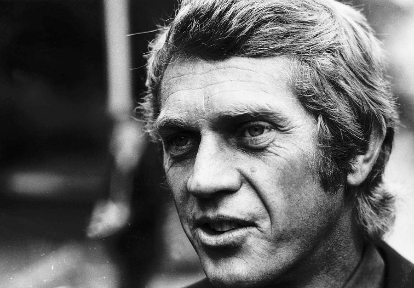When Neile Adams felt the cold barrel of a pistol pressed against her temple, she realized the unsettling truth: the man she married, the charismatic and daring Steve McQueen, was not just a Hollywood antihero but a deeply troubled and dangerous individual. What began as a whirlwind romance, fueled by McQueen’s magnetic persona, devolved into a nightmare of control, jealousy, and abuse—a reality far removed from the silver screen roles that made him an icon.
Adams, who met McQueen in the 1950s after moving to the United States from the Philippines, quickly fell for the rebellious charm that defined McQueen both on and off-screen. The couple married, had two children, and from the outside, their life seemed like a Hollywood fairytale. However, behind closed doors, Adams faced a much darker reality. McQueen’s womanizing was rampant, his cocaine addiction spiraled out of control, and his paranoia escalated to dangerous levels.
One evening, after McQueen had consumed a significant amount of cocaine, he became increasingly paranoid, convinced that Adams was having an affair. 
This incident was not an isolated one. McQueen’s treatment of women—especially those closest to him—was marked by extreme possessiveness and control. He believed that while he had the right to sleep with whoever he pleased, including prostitutes, his wife was expected to remain utterly faithful. In his eyes, Adams’ body was his property, a belief that led to further emotional and physical abuse.
The power dynamics in their marriage were clear: McQueen demanded absolute loyalty, while he indulged in his vices without restraint. When Adams became pregnant, McQueen refused to believe the child was his, pressuring her into an abortion she did not want. The emotional toll was immense, and Adams later reflected on the experience, describing it as a time of deep despair and helplessness.
McQueen’s abusive tendencies were not confined to his marriage with Adams. His relationship with actress Ali MacGraw, whom he met on the set of *The Getaway*, followed a similar pattern. Despite MacGraw’s rising stardom in the 1970s, McQueen demanded that she give up her career, particularly any roles involving romantic scenes. His jealousy and control stifled her professional life, and she did not return to acting until after their divorce in 1978. During their tumultuous marriage, MacGraw, too, faced the brunt of McQueen’s volatile behavior, enduring hours of interrogations driven by his irrational fears and paranoia.
While McQueen’s misogynistic and abusive behavior might seem like a relic of a bygone era, it sadly mirrors ongoing issues both within and beyond Hollywood. The #MeToo movement has exposed the prevalence of men like McQueen in the entertainment industry—figures who use their power and influence to control and harm women. Moreover, the COVID-19 pandemic highlighted a disturbing increase in domestic abuse, with calls to helplines spiking as victims found themselves trapped with their abusers.
Even now, the industry continues to grapple with the fallout of such behaviors. High-profile cases, like that of FKA Twigs suing actor Shia LaBeouf for emotional and physical abuse, serve as stark reminders that the toxic attitudes exemplified by McQueen persist.
Steve McQueen remains one of the most enduring figures in Hollywood history, but his legacy is tarnished by the suffering he inflicted on those closest to him. His story is a sobering reminder that behind the glamorous facade of stardom, dark and dangerous realities often lurk. As society continues to reckon with its past, it must also confront the enduring patterns of abuse and control that McQueen embodied, ensuring that future generations can look back without the same shadows of regret and horror.
Leave a Reply